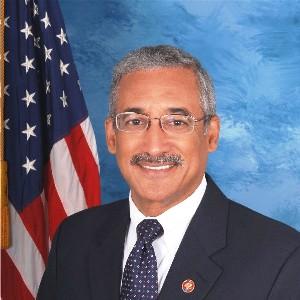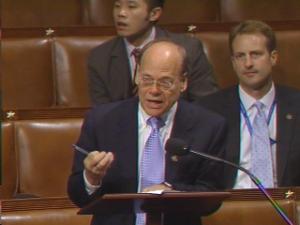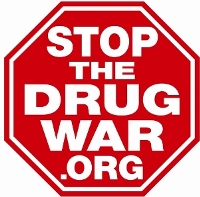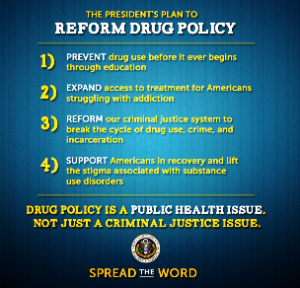Military veterans and civilians, too, are suffering from Post-Traumatic Stress Disorder. Many are finding relief with marijuana, but even in some medical marijuana states, its use is not approved.
MAPS' Psychedelic Science 2013 conference in Oakland showcased important research on MDMA and the treatment of PTSD (as well as lots of other cool stuff).
StoptheDrugWar.org needs your support to continue our work during the most important time in drug reform we've ever seen. We have gifts to send you too, with donations of $15 or more.
The drug czar's office released the 2013 National Drug Control Strategy Wednesday. It talks a good game, but much remains the same.
With the introduction of the Justice Safety Valve Act of 2013 in the House this week, now both houses of Congress have the sentencing reform bill before them.
The US Supreme Court has held that an immigration judge went too far when he ordered the automatic deportation of a Jamaican man who resided in the US for most of his life over the possession of 1.3 grams of marijuana.
The first dispensary in Phoenix has opened, dispensaries in Washington, DC, are ready to go, and there has been more federal enforcement activity in California.
US Rep. Steve Cohen of Memphis has introduced a bill that would create a national marijuana policy commission similar to the 1971 Shafer Commission.
Ten states have seen marijuana legalization bills this year. Now, add Puerto Rico.
A Missouri man is dead after allegedly shooting a shotgun at a police SWAT team that was executing a search warrant at his home.
There are problems at a Maryland state prison in Baltimore, fallout continues from a bust of crooked cops in suburban Chicago, and a jail guard goes down in a Texas border town.
Interns are making an important difference fighting the good fight with us at StoptheDrugWar.org.
Access to medical marijuana continues to expand as more and more states embrace the healing power of the herb. At the same time, hundreds of thousands of veterans of America's decade of wars are returning home burdened with Post Traumatic Stress Disorder (PTSD), a condition as old as war itself, but that in years past went either unrecognized or was seen as a soldier's personal failure, his "shell shock" or "battle fatigue." Could medical marijuana help?

Scott Murphy Iraq deployment photo
Scott Murphy of Newton, Massachusetts, is an Iraq combat veteran who uses medical marijuana for chronic pain. "I use medical cannabis for chronic pain from a motorcycle accident that was aggravated by my military service," Murphy said. "I had a severe accident when I was 18, I have a rod in my femur and four plates in my hip. The pain is to the point where it is affecting my walk."
But Murphy also wants to ensure that his state's new medical marijuana law provides for access to the plant for PTSD. A man Murphy described as his "best friend," a fellow veteran, committed suicide at age 22 after being kicked out of the Army for misconduct related to his mental issues rather than being given a medical discharge as promised.
"He had been showing signs of PTSD," Murphy recalled. "He was a good soldier, but when he got back from his second deployment he was having problems. When they kicked him out of the Army, he went home and killed himself."
Amid increasing evidence that medical marijuana can have a beneficial impact in helping people cope with PTSD, the push is on to expand access to the healing herb. Murphy spent Monday morning testifying at a public hearing on draft regulations for the Massachusetts medical marijuana program. Although voters voted for the initiative that listed specific qualifying conditions -- not including PTSD -- as well as "and other" conditions, state regulators are considering changing that to "and other debilitating" conditions, a change that Murphy and others fear could limit access to medical marijuana for PTSD patients.
In some medical marijuana states, adding PTSD requires going through a medical marijuana regulatory commission; in others, it is being pushed through the legislature. In Oregon, for example, Senate Bill 281, which would add PTSD to the list of treatable conditions, was approved by the state Senate last Thursday, and now moves to the House. In Michigan, by contrast, hearings on PTSD and medical marijuana were held recently by Michigan's Advisory Committee on Medical Marijuana (ACMM).
State legislatures are proving to be an easier path than unelected medical marijuana overseers, said activists. "There have been a number of states that have tried to petition to get it added to the list that have so far failed," said Kris Hermes, media liaison for Americans for Safe Access.
Air Force veteran Michael Krawitz of Veterans for Medical Cannabis Access (VCMA) and a plaintiff in Americans for Safe Access v. Drug Enforcement Agency, a case which seeks to see marijuana moved out of the Controlled Substance Act's Schedule I, agreed. "That Oregon effort is moving in the legislature because the state oversight panel was so intractable," said Krawitz, who was deeply involved in the effort there. "Any time we've had to go through the process provided by the state to address expanding access to medical marijuana, we've had trouble. Michigan is another example. There, there was a petition to add PTSD, but there was no actual process to do so. They were essentially keeping the process from moving forward until [vaunted Michigan marijuana attorney] Matt Abel sued them. Now, we have hearings before the advisory committee."
The need to do something for veterans is a major impetus behind the push, but PTSD effects lots of people who aren't veterans as well. "It isn't just veterans who suffer from PTSD," Krawitz said. "At that hearing, there were many veterans, but also other people who had suffered trauma -- child abuse survivors, rape survivors, emergency response workers."

Michael Krawitz testifying in support of Oregon bill
Still, veterans mustering out after more than a decade of US wars in Iraq and Afghanistan are coming home with PTSD in record numbers. A
2004 study in the New England Journal of Medicine estimated that 18% of returning Iraq combat veterans had PTSD. And a
2008 RAND Corporation report estimated that up to 225,000 veterans will return from the wars with PTSD.
The trauma of war is reflected not only in the number of vets suffering from PTSD, but even more ominously, in sky-high suicide rates. US military veterans are committing suicide at a rate of 22 per day, up 20% from just five years ago. And according to a Veterans Administration study released in February, that number almost certainly undercounts the number of veteran suicides because of data limitations.
The military and public health workers are keenly aware of the problem, and are attempting to address it through means both conventional and unconventional. The military and the Veterans Administration have been open to therapeutic interventions including yoga, meditation, and the use of companion dogs; they have also armed themselves with the arsenal of psychotherapeutic drugs -- anti-depressants, anti-psychotics, tranquilizers -- available in the standard pharmacopeia. But those drugs can have some nasty side effects, and their utility in treating PTSD is questionable; noting reports of negative consequences, the Army has warned against over reliance on them.
In the search for succor, more and more vets and other victims of PTSD are turning to medical marijuana. But there is a problem. Not only do a majority of states not recognize medical marijuana, even in those states that do, many of them do not allow its use for PTSD. Despite mounting evidence that medical marijuana can help with PTSD, only a handful of medical marijuana states have approved its used. According to Americans for Safe Access, only California, Connecticut, Delaware, New Mexico and Massachusetts would allow for its use for PTSD, and as we have seen above, it's still up in the air in the Bay State.
"As we find more and more people, especially veterans, benefiting from its use, we see the unfortunate absence of availability for patients across the country," said ASA's Hermes, "It's only approved in five states; that means well below half the medical marijuana states recognize the need for patients to use it for PTSD."
Americans for Safe Access supports expanded access to medical marijuana for PTSD, according to Hermes. "We wholeheartedly support the efforts to petition where patients can do so to get PTSD added to the list of conditions, and we're also pushing for recognition inside the Veterans Administration, but that's an uphill slog," he said.
And it isn't only PTSD treatment that's at stake for veterans. "I'm not only pushing for chronic pain and PTSD, but other stress-related combat issues, and that language is one of the things I asked [the Massachusetts Department of Public Health] to clarify today," Murphy said in an interview following the hearing. "Does their definition of 'debilitating' include PTSD? If they're going to use a broad definition of 'debilitating' so that it covers the full spectrum of vets' injuries, that would be one thing. But it's unclear if PTSD or other mental conditions will be covered. I think we should leave the wording with "and other" -- that's what the voters voted on. I don't think we should have to wait until someone's PTSD is so bad it's life-limiting to be able to get access."
Massachusetts regulators were supposed to have their draft regulations ready by May 5, but in the wake of the Boston bombings, that is now up in the air.
Part of the problem with winning acceptance of using medical marijuana for treatment of PTSD is the relative paucity of clinical studies on its safety and efficacy. When the state of Arizona considered adding PTSD to its list of qualifying conditions, researchers hired by the Department of Human Services found very little of use in their review of the literature.
But studies do exist. Krawitz and Veterans for Medical Cannabis Access compiled an impressive set of studies suggesting marijuana is safe and effective in treating PTSD and anxiety for Michigan regulators. (They are downloadable as submitted at the following links: Packet 1, part 1 of 3, Packet 1, part 2 of 3, Packet 1, part 3 of 3, Packet 2, Packet 3). That same packet also went out to New Mexico, where an effort to remove PTSD from the list of treatable ailments was foiled, and to Oregon, where the PTSD bill moved forward this week.
"While we don't have a lot of studies titled 'PTSD Response to Cannabis Therapy,' we do have a preponderance of evidence that shows cannabis works in various ways, including for symptoms of PTSD," said Krawitz.

Scott Murphy at 2013 press conference (courtesy ASA via YouTube)
One important reason the hard science officials would like to see on the efficacy and safety of marijuana for PTSD is federal government obstructionism. The
Multidisciplinary Association for Psychedelic Studies (MAPS), for instance, has been
attempting for years to win approval for its study of PTSD and medical marijuana. But it's still waiting and still patiently trying to satisfy the endless niggling of the National Institute on Drug Abuse and the Department of Health and Human Services. The DEA and the courts haven't helped either -- the agency in 2011 denied a request by UMass scientist Dr. Lyle Craker to grow marijuana for research purposes, disregarding its own administrative law judge's recommendation to approve it, and
a court last week sided with DEA.
Nevertheless, anecdotal evidence on marijuana treatment for PTSD is helping to move the issue forward. The site ProCon.org, which features a major section devoted to medical marijuana, has posted several readers' comments on the subject:
"I had severe reservations about 'smoking pot.' It is illegal and I am a health care professional," one anonymous commenter wrote. "Still, I wanted to feel better, to be myself again, and to be the person I was before the PTSD. I smoked the pot. Immediately I felt relaxed and calm. I smiled and laughed. I finally felt at peace for the first time in two years. I slept my first night in three years without the sleep medication. The next day I felt refreshed and renewed. I had hope again. My son told me that he was so happy to see the old me again."
"I was shot thru the right sub and supra orbital sections of the right side of my head exiting over my right ear. They rebuilt 1/4 of my skull," wrote another commenter. "Epilepsy, PTSD, and other issues such as severe anxiety, constant pain and depression... I am still alive because I smoke [marijuana] every day. Empirical evidence has proven to me that failure to utilize generally causes a seizure and at minimum I get really aggressive... I will not live on narcotics. Ibuprofen or aspirin all have side effects worse than any temporary pain. Replacement liver from the damage of man-made drugs? No thanks."
In the meanwhile, veterans and others continue to suffer from PTSD and continue to use marijuana for relief. In states that do not have medical marijuana laws, that makes them criminals. In states that do have medical marijuana laws, but don't allow it to be used for PTSD, they are criminals, too -- unless they hide what they're actually using it for.
"These state medical marijuana control boards are willing to allow vets to have it for pain, but not PTSD, so in states like Arizona, vets suffering from PTSD are using a pain diagnosis to be legal under state law, and that's problematic. We're trying to get people suffering from PTSD to actually come in and get help, and it's difficult because there's a lot of stigma around it. What are we telling our soldiers when we tell them 'tell the doc you have pain, don't say you have PTSD'"? Krawitz asked. "What are we saying about the validity of their condition?"
That leads to other problems, too Krawitz said.
"When we can't recommend medical marijuana for PTSD, we're pushing people to use chronic pain as a qualifying condition, and that leads to police and prosecutors seeing all those pain recommendations and saying there must be fraud in the system," he said. "There are a lot of patients who would otherwise have had recommendations for PTSD."
PTSD sufferers are not waiting for peer-reviewed, clinically-controlled studies to tell them what works. PTSD is a real and growing problem, and medical marijuana appears to do some good. The scientific studies that would satisfy legislators and state review boards need to be done, and that is happening, albeit too slowly, but in the meanwhile, people are suffering because the government they served at risk to life and limb is now obstructing the research that would legitimize their treatment.
back to top
At the Multidisciplinary Association for Psychedelic Studies (MAPS) Psychedelic Science 2013 conference in Oakland this weekend there were mind-boggling displays of psychedelic art; tables full of books on LSD, MDMA, peyote, ayahuasca, and other, stranger hallucinogens; weird musical interludes; holotropic breathwork workshops, and indigenous shamans.

Psychedelic art, MAPS 2013
There was also some heavy duty science. Stretching over five days of workshops and conference presentations, the MAPS conference is perhaps the premier confab of psychedelic researchers worldwide. A look at just some of the topics covered in the remarkably broad-ranging affair makes that case.
Researchers from around the country and the world presented findings on three "tracks": clinical ("LSD-Assisted Psychotherapy in the Treatment of Anxiety Secondary to Life Threatening Illness," "The Neurobiology of Psychedelics: Implications for Mood Disorders"), interdisciplinary ("Psilocybin in the Treatment of Smoking Addiction: Psychological Mechanisms and Participant Account," "Ethical Considerations in the Medicinal Use of Psychedelics"), and a special track on the South American hallucinogenic tea, ayahuasca ("Ayahuasca Admixture Plants: An Uninvestigated Folk Pharmacopeia," "Ayahuasca, the Scientific Paradigm, and Shamanic Healing").
One series of research reports of urgent and immediate relevance centered on the use of MDMA ("ecstasy") in the treatment of Post-Traumatic Stress Disorder (PTSD). Although PTSD can be caused by any number of traumas, veterans mustering out after more than a decade of US wars in Iraq and Afghanistan are coming home with PTSD in record numbers. A 2004 study in the New England Journal of Medicine estimated that 18% of returning Iraq combat veterans had PTSD. And a 2008 RAND Corporation report estimated that up to 225,000 veterans will return from the wars with PTSD.

Dr. Michael Mithoefer describes his MDMA PTSD research protocol
The trauma of war is reflected not only in the number of vets suffering from PTSD, but even more ominously, in sky-high suicide rates.
US military veterans are committing suicide at a rate of 22 per day, up 20% from just five years ago.
The military and public health workers are keenly aware of the problem, and are attempting to address it through means both conventional and unconventional. The military and the Veterans Administration have been opened to therapeutic interventions including yoga, meditation, and the use of companion dogs; they have also armed themselves with the arsenal of psychotherapeutic drugs -- anti-depressants, anti-psychotics, tranquilizers -- available in the standard pharmacopeia. But those drugs can have some nasty side effects, and their utility in treating PTSD is questionable, and, noting reports of negative consequences, the Army has warned against over reliance on them.
In a Saturday clinical track devoted to MDMA and PTSD, researchers reported on success in Phase II clinical trials (after Phase I studies had proven safety), as well as efforts to get more studies up and running, and the hoops they have to jump through to do so. Canadian researcher Andrew Feldmar perhaps best summed up professional exasperation with the complexities of doing research on drugs governments view with skepticism and suspicion.
"Give me a break!" snorted Feldmar after relating how it took 2 ½ years and three visits from bureaucrats in Ottawa to inspect his pharmacy safe before it was approved before the safe and the study were approved. "This is not science, its politics. Those people from Ottawa were doing what power does -- cover its ass and make people doing what it doesn't want squirm. We are not discovering anything with these studies; we are just proving something we already know. This is all politics."

Indigenous Huichol shaman from Mexico
While Feldmar was at least able to report that his study had been approved, researchers in Australia and England could report no such luck.
Australian researcher Martin Williams reported that a randomized, double-blind Phase II study there had been stopped in its tracks by a Human Research Ethics Committee.
"The proposal was rejected by the committee with no correspondence," Williams sighed. "We submitted a comprehensive letter of appeal, and it was quickly rejected. Like MAPS in 2000, we're a bit ahead of our time for Australia, where we face war on drugs rhetoric, the psychotherapy community has more a psychopharmacology focus, and we're facing funding and regulatory hurdles."
"For the past eight years, I've been slowly trying to persuade the medical establishment this is worth doing," said British researcher Ben Sessa, who is trying to get a Phase II study off the ground there. "We have lots of war casualties because like the USA, we have a peculiar obsession with imposing democracy around the world."

Peyote-infuenced Huichol art
But his government grant was denied, with regulators saying there was insufficient proof of concept, the trial would be underpowered (because it was small), and the inclusion of patients with recreational drug histories was problematic.
"Those reasons are all rubbish," snorted Sessa, who said he was revising his protocol in hopes of it being accepted. "We went for the Rolls Royce and didn't get it; maybe we'll get the Skoda," he said.
Researchers at the University of Colorado in Boulder have gotten approval for a Phase II study of MDMA with people with chronic, treatment-resistant PTSD, but it wasn't easy. Sometimes the regulatory niggling borders on the absurd, they said.
"We started two years and were waiting on approval from the DEA," said researcher Marcela Ot'alora, who is doing the study with Jim Grigsby. "We thought they read the protocol and would let us know if we were doing something inappropriate, but that wasn't the case. We had to get a 500-pound safe and we put it in the therapists' office, but no, it had to be in the treatment room. Then, we get a second inspection by the DEA, and they said we had to install alarms. We did so, and thought we were good to go. The next day, the DEA and the city zoning department came together. The zoning department said we had to have a half bath instead of a full bath, and no kitchen."

Psychedelic Homer Simpson, MAPS 2013
Ot'alora showed slides of workers obediently demolishing the bath tub, but their travails weren't finished just yet.
"The zoning department said we had to find a place zoned for addiction and recovery, and my office met that criteria, so we moved the safe and alarms for a third time, then had a third DEA inspection," she related. "The local DEA said yes, but it also needed approval from headquarters. We had a congressman write a letter to the DEA to speed up the process, and now we have final approval and are screening our first participants. We hope to enroll the first one by the beginning of May."
That would appear to be a good thing, because other researchers reported that when they actually got studies up and completed, they were seeing good results. Israeli researcher Keren Tzarfatyl and Swiss researcher Peter Oohen both reported promising preliminary results from their studies.
But it was US researchers Michael and Annie Mithoefer who reported the most impressive results. They reported on a 2004 Phase II clinical trial with veterans, firefighters, and police officers. The research subjects were given MDMA (or a placebo) and psychotherapy sessions. MDMA-assisted therapy resulted in "statistically significant" declines in PTSD as measured by standard scales, the Mithoefers reported.
"We're doing Phase II studies, giving the substance to people who are diagnosed with PTSD and measuring the treatment effects. The results continue to be extremely impressive," said Michael Mithoefer. "These tools have so much promise for healing and growth. There are lots of reasons to think these will be useful and promising tools."
Existing treatments for PTSD -- cognitive-behavioral therapies, psychodynamic psychotherapies, pharmacological interventions -- too often just don't work for large numbers of sufferers, Mithoefer said. He cited estimates of 25% to 50% who don't respond favorably to existing treatments.
"We have looming problems with veterans coming back from Iraq and Afghanistan, and most of them are not getting the treatment they need," said Mihoefer. "The Veterans Administration is overwhelmed, but also many vets just don't show up for treatment or stay in it. People with PTSD have a lot of trouble with trust, making it hard to form a therapeutic alliance. They can also either be overwhelmed by emotion and then drop out, or they are in avoidance, emotionally numb, and then the therapy doesn't work. If MDMA can increase trust and decrease fear and defensiveness, maybe it can help overcome these obstacles to successful treatment."
But even so, the research effort is starved for funds.
"This would not be happening if not for these remarkable non-profits supporting research," said Mithoefer, referring to groups like MAPS and the Beckley Foundation, which co-hosted the conference. "The government is not funding this, Big Pharma isn't funding this; the community is funding it. We are trying to build bridges, not be a counterculture, and we hope the government will get involved."
What they've found so far is definitely worth pursuing, Mithoefer said.
"We've established that for this kind of controlled use with well-screened people, there is a favorable risk-benefit ratio and no indication of neurotoxicity," he explained, although a small numbers of participants reported unhappy side effects, such as anxiety (21%), fatigue (16%), nausea (8%), and low mood (2%).
With a follow-up three years later, the Mithoefers found that the benefits of MDMA-assisted therapy remained largely intact.
"For most people, the benefits in terms of PTSD symptoms were maintained," Mithoefer reported. "With people who completed the assessment, 88% showed a sustained benefit, and assuming that those who didn't relapsed, that's still a 74% sustained benefit."
The Midhoefers are now in the midst of another Phase II study and are finding similar results. They are finding reductions in PTSD symptoms as measured by standard measures. They are also finding lots of interest among PTSD sufferers.
"More than 400 vets have called us from around the country," said Mithoefer. "The need is so great. It's heartbreaking that we can't accommodate them all."
Anna Mithoefer read to the audience some of the responses from their research subjects.
"It's like PTSD changed my brain, and MDMA turned it back," reported a 26-year-old Iraq veteran.
"Being in Iraq was bad, but what was worse was having my body back here and part of my mind still in Iraq," said a 27-year-old who had served as a turret gunner in Iraq. "This helped me come home."
"MDMA helped me in so many ways, it feels like it is gradually rewiring my brain," said a female military sex trauma survivor. "The MDMA sessions were the crack in the ice because the trauma was so solid before that. It was incredibly intense around the MDMA sessions -- a lot like popping a big bubble from the unconscious."
The Phase II studies underway or completed strongly suggest that MDMA is useful in the treatment of PTSD. The Phase II studies trying to win approval around the world could strengthen that case -- if they can overcome the political and regulatory obstacles before them. In the meantime, another 22 veterans are killing themselves each day.
back to top
Dear friend,
StoptheDrugWar.org needs your help to continue our programs -- like this newsletter,
Drug War Chronicle -- during this most important time in the cause there has ever been.
Click here for some examples of how activists around the world rely on
Drug War Chronicle in their work.
As our thanks for your support, we continue our full set of membership offers, some of them available with donations of $15 or greater to our organization. We also continue to offer, with donations of $35 or more, "
Marijuana Legalization: What Everyone Needs to Know," authors of which were
recently hired to consult with the state of Washington on implementing legalization there.
The newest item is a pair of reports that highlight the US and international legal landscapes as legalization becomes a mainstream issue. (We'll send you both for the $15.) Though the text of each report can be found online, for $15 or more you can hold the nice printed copies -- the history in the making -- in your hands. They are:
- "On the Limits of Federal Supremacy: When States Relax (or Abandon) Marijuana Bans," a Cato Institute Policy Analysis by Vanderbilt law professor Robert Mikos, explores the limits in federal law and resources for enforcing marijuana prohibition in states that have legalized.
- "Governing the Global Drug Wars," a special report by London School of Economics IDEAS, details the history of the global prohibition regime; the obstacles it poses to nations seeking to explore legalization and other reforms, and efforts by nations and agencies to transform the system into one respecting public health and human rights.
We are also pleased to continue offering the following items (while supplies last), now also with donations of $15 or more:
- Emperor of Hemp DVD, about the life and work of Jack Herer (memorial tribute edition)
- StoptheDrugWar.org strobe light
- StoptheDrugWar.org stamp and ink pad
- StoptheDrugWar.org mouse pad
Though we offer many items for $15, I hope you will consider making a larger donation if you are able, or supplementing your initial gift with a monthly one. If the gifts are not important to you, I hope you'll consider sending a donation that's just for our work.
Donations can be tax-deductible, supporting our educational work, or non-deductible, supporting our lobbying work. (Note that selecting any gift items reduces the amount of your donation that is deductible -- which with a smaller gift amount can be most of it.) They can be made online on our web site by credit card or PayPal, or sent by mail to P.O. Box 18402, Washington, DC 20036. If you are donating by check, please make it payable to DRCNet Foundation (if tax-deductible) or Drug Reform Coordination Network (if not deductible).
If you wish to donate stock, the information to give your brokerage is Ameritrade, (800) 669-3900), DTC #0188, and account number 781926492 for tax-deductible gifts or 864663500 for non-deductible gifts -- please make sure to contact us if donating in this way.
Thank you for standing with us to stop the drug war's cruelties and meet the opportunity this time offers to make a brighter future. As recent events show: Time, and the truth, are on our side!
Sincerely,

David Borden, Executive Director
StoptheDrugWar.org
Washington, DC
http://stopthedrugwar.org
back to top
The White House Office of National Drug Control Policy (ONDCP -- the drug czar's office) released its 2013 National Drug Control Strategy Wednesday. The strategy is being billed as a "21st Century Approach" to drug use and trafficking, but despite some rhetorical softening maintains the US hard-line approach to the issue.
"The president has outlined his vision of an America built to last -- where an educated, skilled workforce has the knowledge, energy and expertise to compete in the global marketplace. Yet -- for far too many Americans -- that vision is limited by drug use, which not only diminishes the potential of the individual, but jeopardizes families, communities and neighborhoods,"
ONDCP wrote on a
blog post announcing the strategy's release and touting reductions in cocaine and prescription drug abuse as progress made.
"Today we are releasing a science-driven plan for drug policy reform in America to build upon this progress," ONDCP continued. "This 21st century drug policy outlines a series of evidence-based reforms that treat our nation's drug problem as a public health issue, not just a criminal justice issue. This policy underscores what we all know to be true: we cannot arrest or incarcerate our way out of the drug problem."
The strategy emphasizes treatment and prevention, but despite the rhetoric, the Fiscal Year 2014 federal drug budget it accompanies continues to be imbalanced, with 58% of federal anti-drug spending directed at law enforcement and interdiction efforts. That figure does mark a decline from previous years, but only a marginal one.
And even its emphasis on treatment also includes punitive criminal justice elements, such as its embrace of the drug court system, where drug-addicted people are subjected to legal sanctions for such addiction-related behaviors as failing a drug test or missing an appointment. That has some drug reformers calling foul.
"The administration says drug use is a health issue but then advocates for policies that put people in the criminal justice system," said Bill Piper, director of national affairs for the Drug Policy Alliance. "Until the drug czar says it is time to stop arresting people for drug use, he is not treating drug use as a health issue no matter what he says. I know of no other health issue in which people are thrown in jail if they don't get better."
While much of the strategy is little more than the same old same old, the strategy does call for expanded access to naloxone, a low-cost antidote that can reverse the effects of opioid overdoses. That is in response to the rapid growth in prescription drug overdose deaths in recent years.
"Director Kerlikowske should be applauded for taking steps to reduce drug overdose fatalities, but he's not doing much to reduce drug arrests or the many other problems associated with treating drug use through the criminal justice system," said Piper.
But while the drug strategy shows flexibility in its efforts to deal with fatal drug overdoses, it maintains a staunch opposition to marijuana reform and includes attacking outdoor and indoor marijuana cultivation as one of its key goals.
"The administration's continued opposition to marijuana law reform shows they're not serious about reforming US drug policy," said Piper. "At the very least they should stop getting in the way of states that are trying to improve public health and safety by regulating marijuana like alcohol."
back to top
On Wednesday, US Reps. Bobby Scott (D-VA) and Thomas Massie (R-KY) introduced the Justice Safety Valve Act of 2013, House Bill 1695, in the House of Representatives. Identical companion legislation, Senate Bill 619, was introduced in the Senate by Sens. Rand Paul (R-KY) and Pat Leahy (D-VT) last month.

US Representative Bobby Scott (D-VA)
Under pressure from sentencing reform advocates, as well as civil rights activists, Congress modified its strict mandatory minimum drug sentencing regime years ago to create a "safety valve" allowing some -- but not all -- drug offenders to avoid harsh mandatory minimum sentences. The 2013 Justice Safety Valve Act would expand the safety valve to apply to all federal crimes involving mandatory minimums.
"Mandatory minimum sentences have been shown to mandate unjust results," said Rep. Scott. "They have a racially discriminatory impact, studies conclude that they waste the taxpayer's money, and they often violate common sense."
"The one size fits all approach of federally mandated minimums does not give local judges the latitude they need to ensure that punishments fit the crimes," said Rep. Massie. "As a result, nonviolent offenders are sometimes given excessive sentences. Furthermore, public safety can be compromised because violent offenders are released from our nation's overcrowded prisons to make room for nonviolent offenders."
Noting that the federal Bureau of Prisons accounts for 25% of all Justice Department spending, Scott and Massie said passage of the measure was necessary to help reduce "the bloated federal prison population." Drug offenders make up nearly 50% of the more than 200,000 current federal prisoners.
back to top
A 26-year-old Jamaican who has resided in the US since he was three should not automatically be deported for being caught with a small amount of marijuana, the US Supreme Court ruled Tuesday. The case was Moncrieffe v. Holder.
In that case,
Adrien Moncrieffe was caught with 1.3 grams of marijuana when police in Georgia pulled him over for a traffic stop. He pleaded guilty to possession with intent to distribute in a plea bargain in which the state of Georgia agreed to expunge the charges after he served five years' probation.
But a federal immigration judge ruled that the plea bargain made Moncrieffe deportable as an "aggravated felon." While federal law considers possession of small amounts of weed a misdemeanor, federal officials argued that his plea was to an offense analogous to a federal felony and thus calling for automatic deportation under federal immigration law. With the lesser offense, Moncrieffe might potentially face deportation, but the government would not have to seek it and Moncrieffe could make his case before a judge if it did.
The US 5th Circuit Court of Appeals in New Orleans upheld the immigration judge's ruling, but the Supreme Court accepted the case for review last year. On Tuesday, seven justices agreed that Moncrieffe's conviction did not rise to the level of a drug trafficking offense that triggered the aggravated felony classification for deportation under the Immigration and Nationality Act (INA).
"Moncrieffe's conviction could correspond to either the CSA [Controlled Substances Act] felony or the CSA misdemeanor," Justice Sonia Sotomayor wrote for the majority. "Ambiguity on this point means that the conviction did not 'necessarily' involve facts that correspond to an offense punishable as a felony under the CSA. Under the categorical approach, then, Moncrieffe was not convicted of an aggravated felony."
Although federal prosecutors had argued that any marijuana distribution conviction (even intending to distribute one gram) is "presumptively" a felony, Sotomayor and the other six justices weren't buying that.
"That is simply incorrect, and the government's argument collapses as a result," Sotomayor wrote. "Marijuana distribution is neither a felony nor a misdemeanor until we know whether the conditions in paragraph (4) attach."
That paragraph lists exceptions to the offense of marijuana distribution that allow defendants to be considered misdemeanor "simple drug possessors."
To follow prosecutors' logic, Sotomayor argued, "would render even an undisputed misdemeanor an aggravated felony. Recognizing that its approach leads to consequences Congress could not have intended, the government hedges its argument by proposing a remedy: Non-citizens should be given an opportunity during immigration proceedings to demonstrate that their predicate marijuana distribution convictions involved only a small amount of marijuana and no remuneration, just as a federal criminal defendant could do at sentencing," she wrote.
But that approach was "entirely inconsistent with both the INA's text and the categorical approach," Sotomayor stressed. "The government cites no statutory authority for such case-specific fact finding in immigration court, and none is apparent in the INA. Indeed, the government's main categorical argument would seem to preclude this inquiry: If the government were correct that 'the fact of a marijuana-distribution conviction alone constitutes a CSA felony,' then all marijuana distribution convictions would categorically be convictions of the drug trafficking aggravated felony, mandatory deportation would follow under the statute, and there would be no room for the government's follow-on fact finding procedure. The government cannot have it both ways."
And the government's approach would lead to a litany of "absurd consequences that would flow from" immigration investigations into such offenses. "That the only cure is worse than the disease suggests the government is simply wrong," she wrote.
Only Justices Clarence Thomas and Samuel Alito dissented, with Thomas arguing that since Georgia punished Moncrieffe's offense as a felony, he should be deportable under the CSA, and Alito warning that the majority had just given a free ride to "drug traffickers in about half the states."
"In those states," Alito wrote in his dissent, "even if an alien is convicted of possessing tons of marijuana with the intent to distribute, the alien is eligible to remain in this country. Large-scale marijuana distribution is a major source of income for some of the world's most dangerous drug cartels, but the court now holds that an alien convicted of participating in such activity may petition to remain in this country."
Of course, Moncrieffe was not convicted of "large-scale marijuana trafficking" and was not a member of one of "the world's most dangerous drug cartels;" he was a guy busted with a couple of joints worth of weed. And the government may still be able to deport people in Moncrieffe's situation, but now they will have to make the case for deportation before a judge.
back to top
The first dispensary in Phoenix has opened, dispensaries in Washington, DC, are ready to go, and there has been more federal enforcement activity in California. Let's get to it:
ArizonaOn Saturday, the first licensed dispensary in Phoenix opened its doors, but it couldn't serve any customers because an Arizona Department of Health Services computer server was shut down, affecting all the state's dispensaries. The Bloom Sky Train dispensary rescheduled its official grand opening to Wednesday. It will serve some of the state's 35,000 medical marijuana card holders.
California
Last Thursday, federal prosecutors moved against 63 dispensaries in Santa Ana. Prosecutors filed three asset forfeiture lawsuits against properties where seven dispensaries are operating and raided two of the stores involved. Also, prosecutors send threat letters to people associated with 56 other dispensaries. That is every known dispensary in the city. The Santa Ana Police and Santa Ana City Attorney's Office cooperated with the feds.
Also last Thursday, San Diego Mayor Filner published his proposed dispensary ordinance.The proposal is based on the recommendations of the medical marijuana taskforce, organized by City Council President Todd Gloria in 2010. It allows medical cannabis dispensaries to exist in designated commercial and industrial areas of the city with large buffers from sensitive areas, including a 600 foot buffer from schools and parks and a 1,000 foot buffer between dispensaries. The proposal also contains additional strict operating requirements including security systems, restriction on hours of operations and signage.
On Monday, the San Diego city council rejected Mayor Filner's proposed ordinance. Instead, the council voted to reintroduce a more restrictive zoning proposal overturned by a voter signature drive in 2011. The decision came after the council heard hours of testimony, with most speakers favoring the mayor's proposal. But Councilmember Marti Emeral put forth a motion to disregard the mayor’s proposal without any discussion of its provisions and to instead resurrect the proposal put forth by the council, and repealed through voter referendum, in 2011. That measure passed the council.
On Tuesday, the DEA and a local drug task force raided the last dispensary in San Diego and nine associated grow sites. Raided was the One on One Patients Association, whose director, Ken Cole, had testified the previous night at the city council's hearing on the mayor's proposed dispensary ordinance. No arrests were made, but marijuana and other items were seized. Cole is also the director of the area dispensary industry group, the United Patients Alliance.
Also on Tuesday, a medical marijuana regulation bill was approved by a legislative committee. Sponsored by Assemblyman Tom Ammiano (D-San Francisco), Assembly Bill 473 would create a medical marijuana regulation division in the Department of Alcoholic Beverage Control to "regulate the cultivation, manufacture, testing, transportation, distribution, and sale of medical marijuana" on a statewide basis. The measure passed the Assembly Public Safety Committee, which is chaired by Ammiano.
Also on Tuesday, Tulare County supervisors extended their ban on new dispensaries or the expansion of existing for another two years. An existing ban was set to expire next week, and officials said the ban was needed because of constantly changing laws, regulations, court rulings and lawsuits. The county said the changing legal landscape for medical marijuana makes it difficult to license new facilities. The ordinance only bans new facilities or the expansion of those already in existence. Those currently operating will not be forced to close.
On Wednesday, the DEA raided two San Diego area hydroponics stores. Local activists reported that the targets were Miramar Hydroponics in San Diego and Santee Hydroponics in Santee. No word yet of what was seized or whether anyone was arrested.
Connecticut
On Monday, a hearing on proposed medical marijuana regulations drew a standing room only crowd at the Department of Consumer Protection. Crowd members voiced concerns about the regulations' potential effect on lawful marijuana producers and distributors. The two most frequent concerns among the business community came in response to proposed requirements for escrow accounts and brand naming. The regulations stipulate that marijuana producers establish a $2 million escrow account or line of credit which the state could seize if the producer failed to maintain a timely and successful operation. Drug abuse activists on hand at the public hearing expressed their own concerns about the regulation, mostly related to the possible diversion of medical marijuana for recreational use and advertisements targeting youth. The Department of Consumer Protection is expected to submit the final regulations to the General Assembly by July.
District of Columbia
On Tuesday, the Capital City Care dispensary announced it had received its business license. Dispensary operators said they would begin serving patients "as soon as possible," but they have to wait for the DC Department of Health to begin its patient registration process. Two other DC dispensaries, Takoma Wellness Center and the Metropolitan Wellness Center, are also waiting to accept patients. It's only been 15 years since DC voters approved medical marijuana in a 1998 initiative.
Rhode Island
Last Friday, the state's first dispensary opened. The Thomas C. Slater Compassion Center opened in Providence. At least two more are slated to open in coming months.
back to top
A bill that would establish a National Commission on Marijuana Policy was introduced in the US Congress last week. Filed by Rep. Steve Cohen (D-TN), House Bill 1635 seeks a commission that would undertake a comprehensive review of the costs and benefits of current federal marijuana prohibition, as well as examining how federal policy should interact with state laws that have either approved medical marijuana or legalized marijuana outright.

Steve Cohen (house.gov)
Cohen's proposal is inspired by the 1971
Shafer Commission on Marijuana and Drug Abuse, which was commissioned by President Richard Nixon but then shelved when it recommended decriminalizing marijuana. The commission report resulted in decriminalization in a handful of states in the
1970s, before marijuana reform went into the deep freeze during the Reagan era.
"Regardless of your views on marijuana, it's important that we understand the impact of current federal policy and address the conflict with those state laws that allow for medicinal or personal use of marijuana," said Congressman Cohen. "This conflict is only going to continue to grow over the next few years and we must provide certainty to the millions of individuals and businesses that remain caught in a web of incompatible laws. A national commission would provide us with the information we need to create sensible policy going forward."
Joining Cohen in backing the bill are cosponsors Reps. Earl Blumenauer (D-OR), Sam Farr (D-CA), Jim Moran (D-VA), and Jared Polis (D-CO).
"The Obama administration has repeatedly stated that a national conversation is needed when it comes to our country’s marijuana policies, but so far that conversation has been largely one sided," said Erik Altieri, communications director for NORML, which worked with Cohen on drafting the bill. "It is time for federal lawmakers to listen to the voice of the majority of Americans who want to see change to our nation’s marijuana laws and for them to take part in that dialogue."
"We have clearly reached a point where the American people want marijuana prohibition to end," said Steve Fox, national political director for the Marijuana Policy Project. "The states have been taking the lead, but the federal government must catch up. It is no longer a question of whether the federal government should allow states to enact their own marijuana policies. Of course, it should. The question now is how to reconcile state and federal laws. This commission bill proposes a study and a discussion that is long overdue."
The proposed commission would consist of 13 members: five appointed by the president; two appointed by the Speaker of the House; two appointed by the House minority leader; two appointed by the Senate majority leader; and two appointed by the Senate minority leader.
Eighteen states and the District of Columbia allow patients with qualifying conditions to use medical marijuana with recommendations from their physicians. In November, voters in Colorado and Washington State approved measures making marijuana legal for adults 21 and older and directing state regulatory bodies to create regulations for businesses to cultivate and sell marijuana to adults.
back to top
Puerto Rico has become the latest US state or dependency to see a marijuana legalization bill filed this year. Sen. Miguel Pereira earlier this month filed Senate Bill 517 (link is in Spanish) earlier this month.

The Old Capitol, San Juan, Puerto Rico (senadopr.us)
Ten states have seen marijuana legalization legislation so far this year. They are Alabama, Hawaii (already dead), Maine, Maryland (already dead), Massachusetts, Nevada, New Hampshire, Oregon, Pennsylvania, and Rhode Island.
The bill introduced by Periera, a former police chief and federal prosecutor, would amend the island's drug statute so that it "will not be applicable to the possession of up to an ounce of marijuana by adults 21 and over." It does not address marijuana cultivation or commerce.
While the bill's prospects are cloudy, space is emerging in the island dependency for a discussion of marijuana policy. Last week, Puerto Rican Gov. Alejandro Garcia Padilla suggested he was open to such a discussion.
"I don't have a problem with an open debate about the possibilities, benefits or drawbacks of such a measure," Garcia Padilla said during a press conference.
The bill has been assigned to the Senate Committee on the Judiciary, Security, and Veterans Affairs.
back to top
A Warrensburg, Missouri, man was shot and killed by police executing a drug search warrant last Thursday night. Beau Appleton, 57,becomes the 10th person to die in US domestic drug law enforcement operations so far this year.
According to
local media reports, members of the Warrensburg Police Department's Special Emergency Response Team (
SERT) went to Appleton's home to serve a drug search warrant. He "apparently" fired a shotgun at the
SERT team as its members entered the residence. Police then opened fire, killing Appleton.
No further details on the shooting were available. Police have not said whether any officers were injured in the incident.
Police said they seized drugs, drug paraphernalia, and firearms, but have not released more specific information.
While the extent of Appleton's criminal history isn't clear, records show he was arrested for drunk driving in Illinois in 2011 and again for driving without a drivers' license in Missouri in February.
The Missouri State Highway Patrol is investigating the shooting at the request of the Warrensburg Police.
back to top
There are problems at a Maryland state prison in Baltimore, fallout continues from a bust of crooked cops in suburban Chicago, and a jail guard goes down in a Texas border town. Let's get to it:
In
Schaumberg, Illinois,
two former Schaumberg police officers were sued last Thursday by a man who alleges they planted drugs and drug paraphernalia on him during an illegal search in August 2012. Wisconsin resident Chris Nelson said former officers John
Cichy and Terrance O'Brien rousted him outside a nightclub and planted cocaine and digital scales on him, then arrested him. Those two officers, along with former officer Matthew
Hudak, were arrested in January on federal charges that the stole and resold drugs. Nelson is seeking more than $50,000 in damages in the five-count suit, which accuses the village and two officers not only of false arrest and conspiracy but also violation of due process, negligent supervision and indemnification. At least a dozen people convicted of drug offenses have been cleared of the charges since the trio of rogue cops were arrested.
In Baltimore, 13 Maryland state prison guards were arrested Tuesday on federal charges they aided and abetted a prison gang's drug trafficking scheme. The 13 prison guards, all women, are accused of "essentially handing over control" of the Baltimore City Detention Center to leaders of the Black Guerrilla Family gang. Four of them got pregnant by one inmate, and two of them had that inmate's name tattooed on their bodies. The guards allegedly helped the gang run its criminal enterprise by smuggling drugs, cell phones, and other contraband into the prison. The gang leader allegedly used some of the proceeds to buy luxury cars, which he allowed some of the guards to drive. The 13 guards are charged with racketeering offenses.
In Rio Grande City, Texas, a Starr County jail guard was arrested Tuesday on drug possession charges as authorities investigate whether he was selling them to inmates. Rogelio Canales, 67, now a former Starr County jail guard was caught possessing "a slew of narcotics," including marijuana and cocaine while working at the jail. He currently faces four counts of possession of a controlled substance.
back to top
StoptheDrugWar.org works for an end to drug prohibition worldwide and an end to the "drug war" in its current form. We believe that much of the harm commonly attributed to "drugs" is really the result of placing drugs in a criminal environment. We believe the global drug war has fueled violence, civil instability, and public health crises; and that the currently prevalent arrest- and punishment-based policies toward drugs are unjust. Please visit our web site, and please read more about us.
We are seeking Legislative, Writing/Research, Web Content, Information Technology, and Admin/Finance interns (potentially still this semester, depending on your interests, definitely for the summer). Communications may also be applicable to current organizational projects. Preference will be given to applicants with some demonstrated experience the relevant fields, and to applicants in the Washington, DC area. However, consideration will also be given to enthusiasm for drug policy and criminal justice reform.
Note that StoptheDrugWar.org internships are unpaid. We reimburse for metro fare. Please also note that the organization has functioned as a "virtual office" environment since spring 2011. Staff will meet with interns on a regular basis during the semester, and can be available to meet and work together on a weekly or even daily basis, but this will happen in places like coffee shops or campuses.
In order to help our interns forge ties with the larger community, we are organizing intern networking social hours with other organizations in drug policy and justice reform. We are also arranging tours of the DC courts and possibly jail, and public health and other programs that have bearing on drug policy. Interns are also welcome to join us at the frequent legislative working group meetings that take place on our issues here in Washington.
Please send cover letter, resume, and any supporting material you'd like to include, to StoptheDrugWar.org executive director David Borden, at [email protected]. (We recommend using a return receipt to ensure your emails are not blocked by any filters.) Thank you, and we look forward to hearing from you. Information on our specific intern positions follows below.
Legislative
Legislative interns will help, and in some cases play a leading role, on the following organizational projects:- Bill and vote tracking, at the federal and state level, including write-ups for our web site's legislative center (possibly in collaboration with Writing interns);
- Creating action alerts on current legislation and other advocacy priorities, to be distributed through our web site and email list (possibly in collaboration with Writing and Web Content interns); and
- Coalition outreach to secure partners for organizational sign-on letters to Congress.
Interns may also join us at working group meetings on issues including but not limited to sentencing reform, drug policy including marijuana law reform; collateral consequences of criminal convictions; and reinvigorating the presidential clemency/pardon system. Spanish-language skills may be useful.
Writing/Research
Writing/Research interns will have the following opportunities:
- Assist Drug War Chronicle editor Phillip S. Smith with ongoing article collection and research for feature articles on our web site (which are frequently reprinted on major news sites such as alternet.org).
- Assist with research on special topics, the goal of which is the publication of special reports. Likely projects include but are not necessarily limited to follow-up research on US drug war killings (see our recent report here); procuring drug arrest data and possibly arrest reports from various jurisdictions for various months and years, to evaluate the results of recent policy reforms, particularly for marijuana.
- Bill and vote tracking, at the federal and state level, including write-ups for our web site's legislative center (possibly in collaboration with Legislative interns);
- Creating action alerts on current legislation and other advocacy priorities, to be distributed through our web site and email list (possibly in collaboration with Legislative interns);
- Updating an archive of SWAT raids and other paramilitarized policing activity that went wrong (possibly in collaboration with Web Content interns); and
- Assisting with updating or creating various special sections of our web site (possibly in collaboration with Web Content interns).
Interns with Spanish-language skills may be involved with reporting on the Mexican drug war.
Web Content
Web Content interns will assist with the following work:
- Daily link and other content postings;
- Development or maintenance of special sections of our web site (possibly in collaboration with Writing interns); and
- General social media work, including a number special social media projects.
We may also initiate an informal web video series, for which intern assistance would be invaluable, but this has not been decided yet.
Information Technology
IT interns will assist with the following projects:
- Backend web site programming, primarily involving streamlining of our donations processing system;
- Server migration to a "cloud" arrangement;
- Security including PCI compliance;
- Selection and set up of needed software and services; and
- Database-related projects.
Admin/Finance
Admin & Finance interns may assist with the following organizational needs, among others:
- Bookkeeping;
- Nonprofit accounting including intra-company allocations and 990 preparation;
- Budget & cash flow analysis;
- Membership administration;
- Database work.
Admin & finance interns will gain familiarity with a significant range of nonprofits' administrative activities, and depending on schedule may have the opportunity to sit in on portions of board discussions or meetings with advisors.
Communications
As noted above, communications skills are applicable to a number of facets of our work this semester, and communications majors are encouraged to apply. We have not listed communications as a separate internship this semester, because we have not decided whether to engage in specific outreach efforts to mainstream media this semester. Along with the possibility that we will do so, other work of relevance to communications can be found in our Legislative, Writing, and Web Content internships.
Thank you for considering an internship with our organization. We look forward to hearing from you.
back to top












